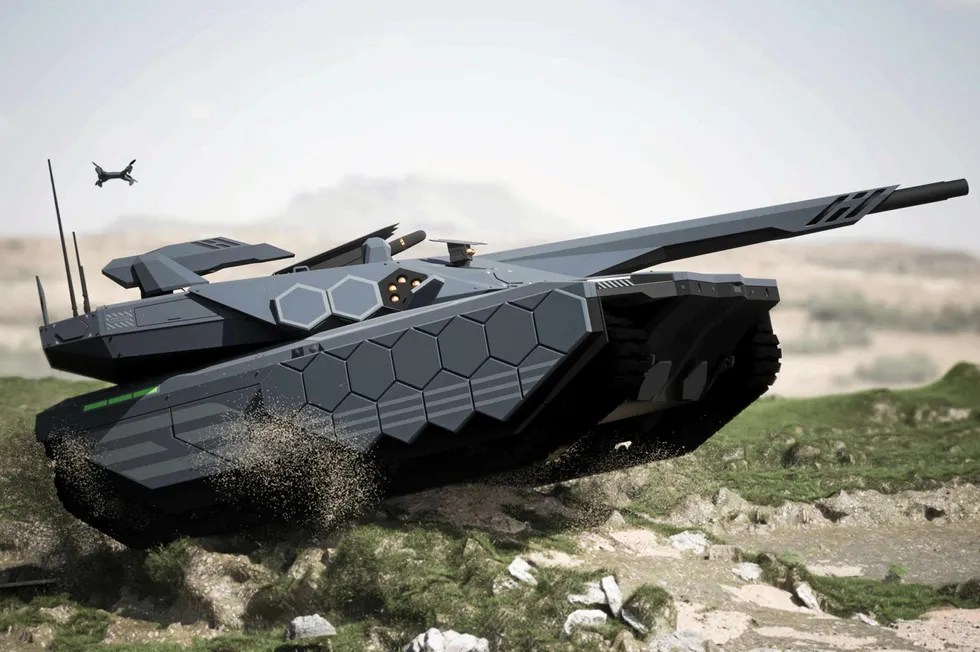
When Rivian posted its now legendary “tank turn” video back in 2019, it forced a lot of people to realize that electric drive could open up new possibilities for the way cars move. Now, Hyundai Rotem is promising to build a silent, electric-drive battle tank that can pull off the same trick — and a whole lot more.
Diesel-electric drive technology isn’t new. It’s been powering trains, cranes, and other big machines for decades. It’s only relatively recently that the US military began experimenting with diesel electric “hybrid” tanks, however — with the Bradley BHEV prototype breaking cover (publicly, at least) for the first time in 2022. The US Army reported that the hybrid electric drive configuration allowed for a 20% improvement in fuel economy, increased operating range, and improved performance. At the same time, the Army speculated that the Bradley BHEV would require reduced maintenance compared to its diesel counterparts, due to a reduction in the number of moving parts and the reduced load(s) on the diesel generator.
Hyundai Rotem’s latest concept takes that idea a step further by removing the diesel generator altogether and replacing it with hydrogen fuel cells that would not only send power to electric motors driving the tank’s treads, but do so silently.
What’s more, because a fuel cell and battery pack-equipped tank can operate without giving off a diesel exhaust’s heat signature, it effectively masks the tank from thermal vision equipment and heat-seeking weaponry.
“In line with the ESG [environmental, social, governance] trend, we are developing tanks powered by hydrogen fuel cells, an eco-friendly energy source,” a Hyundai Rotem official said. “In collaboration with the [Korean government’s] Agency for Defense Development and others, with the development expected to be completed around 2040 according to the research roadmap.”
Which — look, calling hydrogen a “green” fuel is controversial, at best. It’s certainly impossible for hydrogen to compete with battery electric for transportation, but there may be a case for its use in extremely energy-dense situations like severe duty heavy equipment that might sink into mud or dirt due to the weight of its batteries or, frankly, military operations where cost and emissions are less of a concern than the ability to effectively help kill people before they kill you (no need to sugarcoat it). In that context, hydrogen might make sense.
Hyundai certainly thinks so, and the concept shown here enhances the capabilities of the company’s existing K2 main battle tank with better acceleration, quieter operation, and radar absorbing materials that, combined with the vehicle’s low heat signature, make it a very formidable machine.
The tank also features, autonomous driving to reduce the threat to human assets, remote drone operation for reconnaissance and support operations, and a 130 millimeter smooth bore gun.
Hyundai plans to begin production of a similar machine in the next decade, with the goal of eventually achieving a fully electrified tank platform by 2040.
Electrek’s Take

Pak Jae-yeol, commander of the 7th Corps, told The Korea Economic Daily that, “if tactical equipment such as tanks and helicopters move without noise and fumes, the army’s power will become stronger.”
It’s hard to argue with that. What I can argue with, however, is Hydrogen Insight’s assertion that, “Battery-electric military vehicles are not considered a practical option because armed forces cannot rely on access to an electricity grid in wartime.”
It’s hard to think of a dumber solution to fuel insecurity than hydrogen — a fuel that is notoriously difficult to refine, store, and transport (safely or otherwise). Especially when off-grid solar and wood-burning solutions for generating heat and electricity are actively being developed by other respected defense contractors like Rolls-Royce and Volvo.
But no one asked me, right? The good news is that I’m asking you whether or not any of that makes sense, so head on down to the comments and tell me how it is.
SOURCE | IMAGES: Hyundai Rotem, via The Korea Herald; Fuel Cell Works, Hydrogen Insight.
